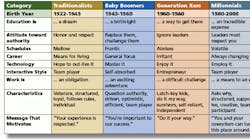By NITA BROOKS
Every contractor faces the difficult challenge of finding and retaining good employees. In today's world, you can no longer rely on finding people who expect to stay with a company for life, as they may have in past generations. Every generation has gaps in understanding each other, influenced by differences in the historical events that defined their generation.
These differences are further defined by influential people, opinions, habits, and behaviors of their age group. The sum total of experiences, ideas, and values shared by people of different generations makes for a "melting pot" of work approaches and work priorities.
Generational Misunderstandings
In today's workforce, these gaps frequently cause misunderstandings, distrust, and differences in work priorities. When left unattended, a disrespectful workplace will result in low employee morale, lack of motivation, no accountability, and distrust among the employees. This atmosphere will result in high turnover, absenteeism, complaints, and possibly illegal behavior. Without intention, the company culture that's developing will be a destructive one.
There are four defined groups in today's workplace — Traditionalists, Baby Boomers, Generation Xers, and Millenials. Each of these groups will have different cultural impacts that helped to define the generations, some of which include world events, family influences, educational backgrounds, and entertainment influences.
As managers, understanding the characteristics of each generation is a key component to developing a company culture that will encourage employees to work together harmoniously. The most successful leaders will find ways of letting each different generation be heard.
Allowing for workforce diversities can help us to encourage interaction in a more productive manner than before, thus creating an environment for employees to recognize and accept generational differences when confronted. If nurtured, this company culture should result in a stable workforce, and flow through to your customer interactions, resulting in higher closing ratios for sales than before.
Overcome the Differences
How can you start to overcome the generational gaps in your company?
To begin with, every employee must agree to adhere to your company's strong core values, which drive your business strategies, with an emphasis on respect in the workplace. It's important to note that all employees should be held to the same standards.
There should be no flexibility that compromises the integrity of the job. The key here is that not all employees have to be treated the same, since the expectations from each generation are different.
What works for Traditionalists may not work for Generation Xers. To a Traditionalist, no news is good news. To a Baby Boomer, give feedback with lots of documentation. To a Generation Xer, allow interruptions for them to ask how they're doing. Give a Millennial feedback at the touch of a button and they'll be happy. Giving feedback to a Traditionalist or a Baby Boomer that's helpful and informative may appear formal and "preachy" to a Generation Xer. Giving immediate and honest feedback to a Generation Xer may appear hasty or even inappropriate to another generation.
To Manage is to Understand
Today's workforce has more generations than any other time in history. Managing generational diversity in the workforce means the ability to understand, relate to, and work effectively with all generations.
Managers should develop a clear understanding of the expectations and motivators for each generation in the workforce, and be flexible enough to adapt their management style in recognition of the strengths of each employee.
The Traditionalist will be respectful of authority, dedicated to lots of hard work, and wait patiently for recognition. Traditionalists will rarely challenge the status quo. The Baby Boomer will question authority, but be committed to the team and supportive of the overall goals.
Generation Xers are self-reliant survivors, more loyal to peer relationships, but highly skeptical. Generation Xers will research everything on the Internet and don't respond well to rigid work requirements.
Millennials will thrive on flexibility, groomed to achieve, with the lowest parent-to-child ratio in U.S. history. A Millennial may have a hard time communicating face-to-face, but may be a wiz with technology. All Millennials are new to the workforce and are in need of mentoring. This group appreciates structure and will pair well with learning from the Traditionalists.
Within all of the generations are core values and assets for employers to capitalize upon.
Once you understand where the newer generations are "coming from," it will be easier to target the management style that will make the most of each of the generation's strengths, and you can start to enjoy the generational differences.
Nita Brooks is the business development manager for International Service Leadership (ISL) with more than 22 years of successful business development experience to the HVAC arena. To contact her, e-mail [email protected]. For information on ISL, visit www.islinc.net








